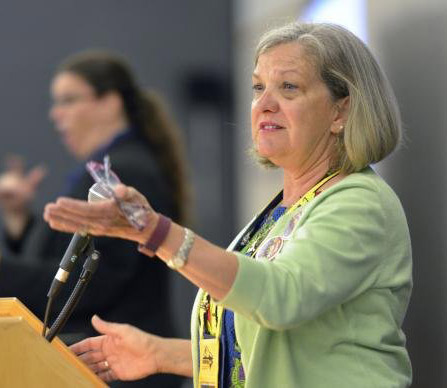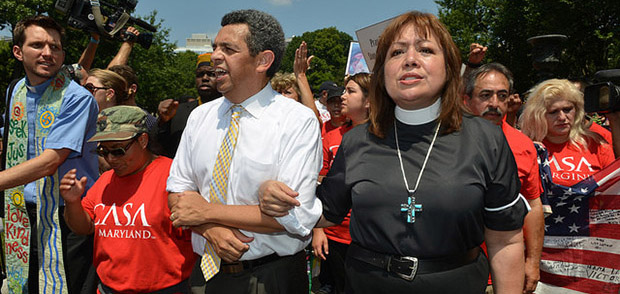A churchwide agency charged with monitoring the participation of women in the United Methodist Church has asked to observe the judicial process investigating complaints against Bishop Minerva G. Carcaño, who has been suspended from active ministry for a year without explanation.
The General Commission on the Status and Role of Women formally requested March 11 to monitor the proceedings against Carcaño, who was suspended from active ministry with full pay and benefits March 8, 2022, after two complaints were filed against her. Dawn Wiggins Hare, top executive of the women’s commission, said the request from the commission’s board “was driven by board member concerns over the one-year anniversary.”

Dawn Wiggins Hare
The monitoring agency announced its request in a news release that reads in part: “The United Methodist Church has given the General Commission on the Status and Role of Women the responsibility to ‘function as an advocate with and on behalf of women individually and collectively within The United Methodist Church.’ This week marks the one-year anniversary of the placing of Bishop Minerva Carcaño of the San Francisco Episcopal Area on suspension. Statements have been issued to indicate that Bishop Carcaño was suspended in response to the filing of complaints against her.
“For God’s work of justice, reconciliation and healing to be realized in the body of Christ, fair process in the life of the Church must be applied to all parties involved equally and in a timely manner. Justice delayed is in fact justice denied with the compounding of harm as the process is prolonged. No healing can begin until there is a resolution. On the face of this extended suspension, serious questions arise as to the process being followed and the causes for this delay.”
“Justice delayed is in fact justice denied with the compounding of harm as the process is prolonged.”
The commission’s statement was signed by Hare and Bishop Tracy S. Malone, board president and episcopal leader of the UMC’s East Ohio Area. Malone is one of Carcaño’s colleagues on the Council of Bishops.
The women’s commission request follows an increasing number of public statements from other parts of the church expressing concerns over Carcaño’s unprecendented yearlong suspension. These have included letters from MARCHA (Methodists Associated Representing the Cause of Hispanic/Latino Americans), the denomination’s Hispanic and Latino caucus, and ethnic leaders in the California-Nevada Conference, according to a March 15 article by Heather Hahn of UM News. Both groups have called for Carcaño’s immediate reinstatement.
An opinion article by this writer questioning the circumstances of Carcaño’s suspension and the adjudication of her case was published by Baptist News Global March 15. Shortly after an earlier version of the article was posted March 9 on United Methodist Insight, the California-Nevada Conference committee on the episcopacy published an explanation of Carcano’s case on its website. Published without a date in March, the statement traced to an episcopacy committee report originally posted Dec. 22, 2022, and apparently was noted as updated in the March post.
In the California-Nevada statement, the episcopacy committee, which is investigating the complaints against Carcaño, said her case was being processed under a different provision of the United Methodist Book of Discipline other than Paragraph 413, which is the primary rule regarding complaints against bishops.
Instead, the episcopacy committee said it is conducting the investigation under the provisions of Paragraph 2704.1c in which complaints are referred to the church’s counsel for scrutiny. According to Hahn’s article, “The Discipline’s Paragraph 2704.1c says that if at least five members of the committee on investigation recommend, the jurisdiction’s episcopacy committee may suspend the person under complaint ‘pending conclusion’ of the church trial process.”
Carcaño’s case was delayed last summer when she appealed her ongoing suspension to the Judicial Council, the UMC’s “high court.” When the Judicial Council declined to take up her case, saying it wouldn’t intervene in a complaint still under adjudication, the investigation reverted to the Western Jurisdiction College of Bishops and the California-Nevada Conference. Since then, the Council of Bishops has requested a ruling from the Judicial Council on whether parts of Paragraph 413 are unconstitutional. The bishops requested an expedited ruling, and the Judicial Council has added the request to its current docket, Hahn reported.
“It is critical to maintain confidentiality in the event that just resolution is achieved, or the charges are dismissed.”
Apparently responding to the increasing outcry over Carcarno’s extended suspension. Bishop Karen Oliveto and the jurisdiction’s committee on episcopacy chair Dan Hurlbert said in a joint email published by UM News, “It is critical to maintain confidentiality in the event that just resolution is achieved, or the charges are dismissed. If so, the accusations may become irrelevant.” Oliveto leads the Mountain Sky Conference and is president of the Western Jurisdiction College of Bishops. Complaints filed against bishops are first submitted to the jurisdiction’s college of bishops for further investigation.
Oliveto and Hurlbert told UM News they would set up a meeting with representatives from the General Commission on Status and Role of Women regarding the monitoring request. The two leaders also said they would welcome additional monitoring from the UMC’s General Commission on Religion and Race, since Carcaño is Latina.
Cynthia B. Astle is a veteran journalist who has covered the worldwide United Methodist Church at all levels for more than 30 years. She serves as editor of United Methodist Insight, an online journal she founded in 2011.
Related article:
What has happened to suspended UMC Latina bishop? | Opinion by Cynthia Astle

